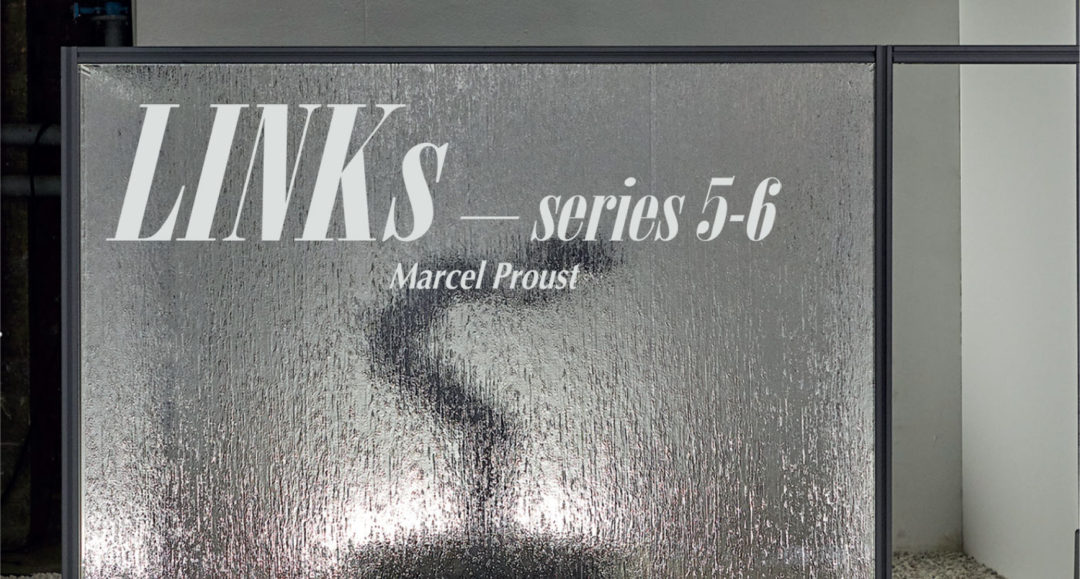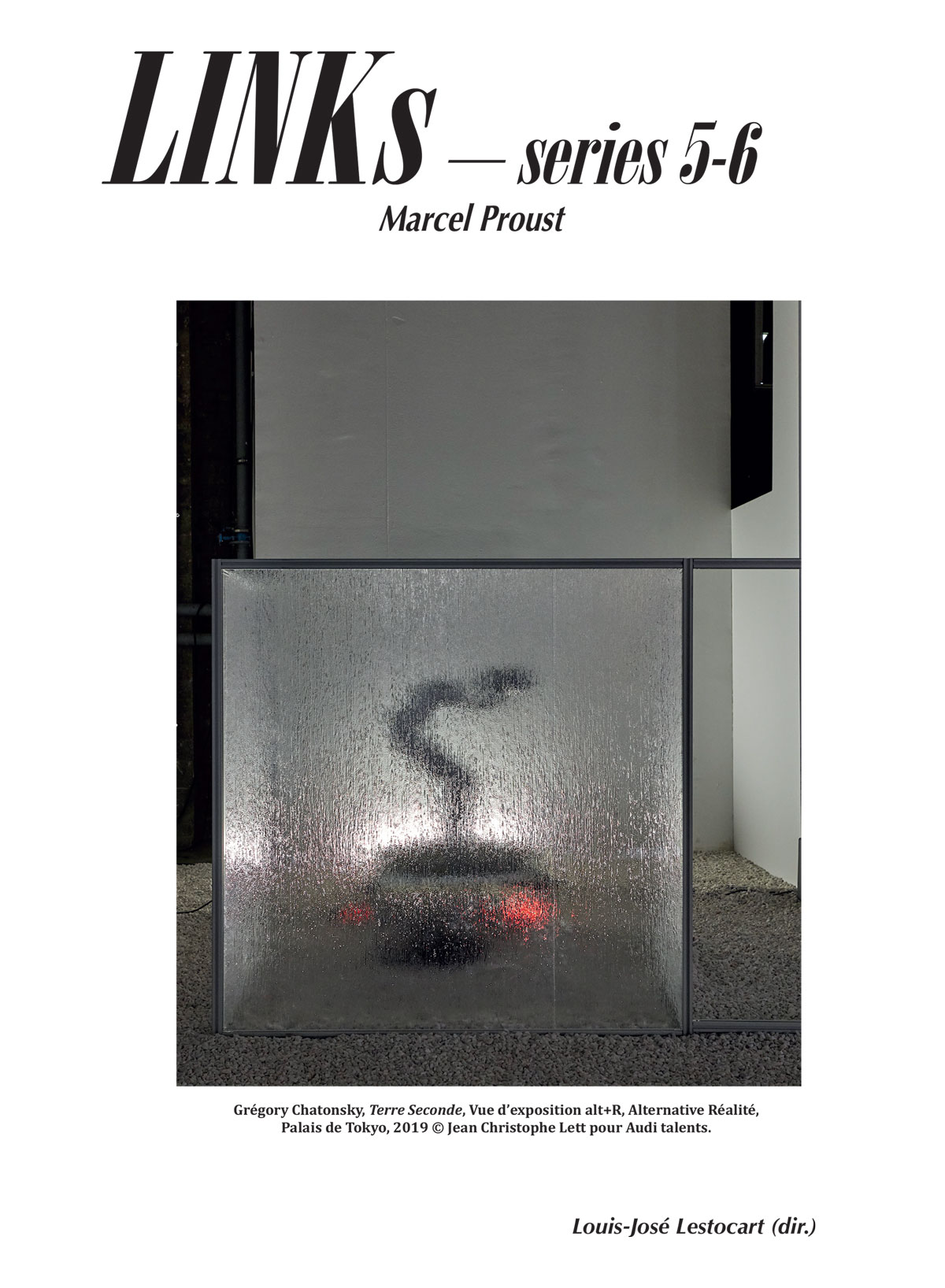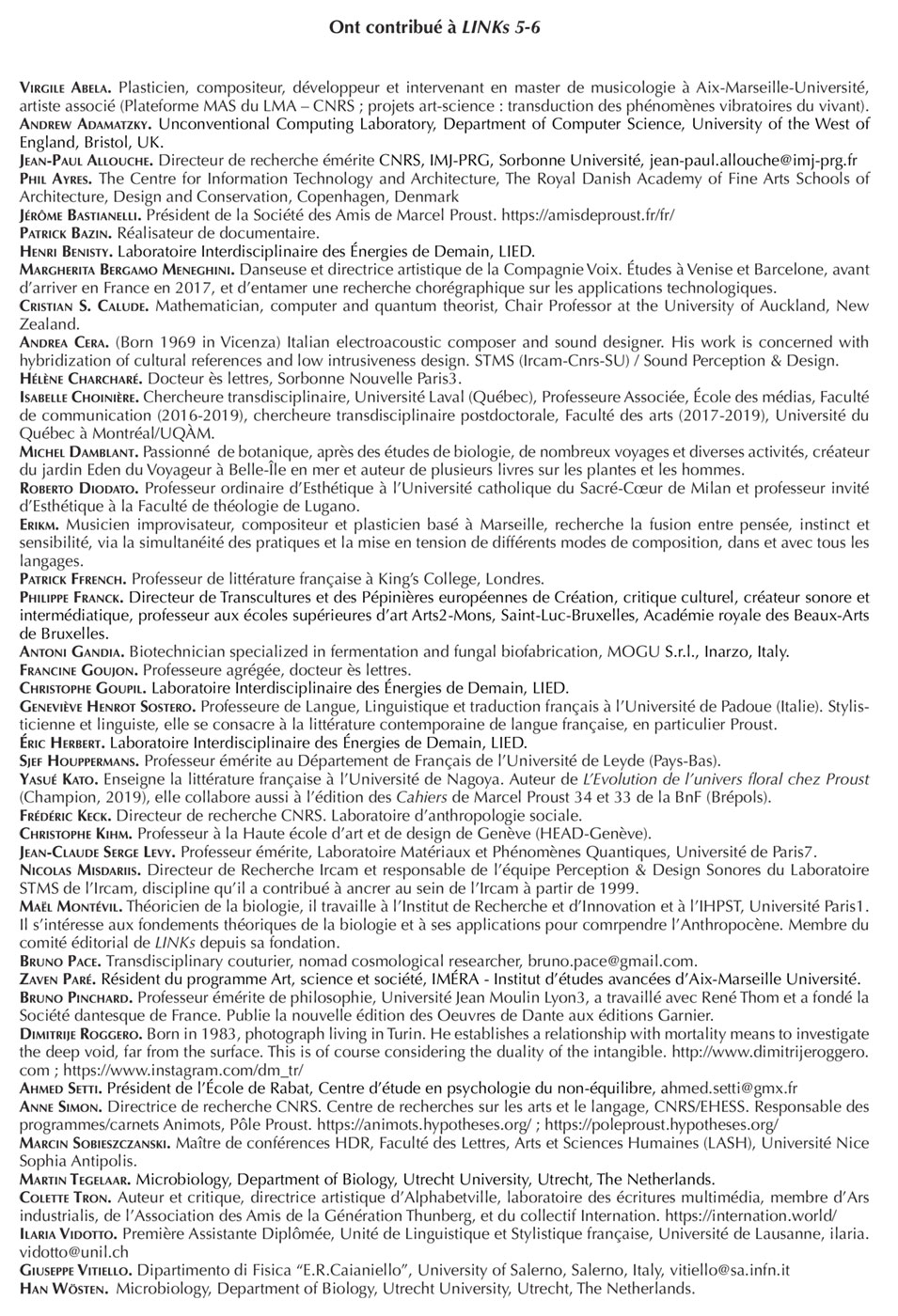Transdisciplinary and international review launched in October 2019, both demanding and accessible free of charge, LINKs is a beautiful stirrer of thoughts that crosses different fields of scientific investigation (from neurosciences to quantum physics, from artificial intelligence to systems theory), philosophical, artistic (again with a wide range covered and crossing various contemporary practices). We can only support such an adventure which succeeds in bringing together such a great committee of talented researchers, academics, critics, artists.
As Louis-José Lestoquart, the director / initiator of this unique review, which also combines French and English, points out:
“In a context where culture and civilizations are in transition, where global politico-economic and technological data are once again disrupted, particularly with the emergence of Big Data, connected objects and transhumanist thinking, LINKs is breaking away from reductionists and questions the notion of reality through kinds of “thought experiments”. It offers essays more than theories. She does not “teach” specifically, but experiencing and living herself through her writings, she shows attempts, operates through very varied and extensive fields, returns in infinite numbers, in order to find the right language, the principle of intelligibility”.
A double issue (#5 & #6) has just appeared as if to reassure us about the very living state of critical thinking in these mono-obsessive times. While an important dossier is devoted to the complexity and aesthetics of the famous French writer Marcel Proust, many other themes are also explored.
In the “Scientific Perspectives” part, we can dive into the world of quantum computing (Cristian S. Calude), think about resilience (Christophe Goupil, Eric Herbert, Henri Benisty), the hypothesis on Homo-Canis parallelism in human evolution (Christophe Kihm) or even going from the semiophysics to the ‘Divine Comedy’ (Bruno Pinchard), while in the section “Art (s) and (some) thoughts”, the sound arts and their various challenges are quite present with a history typological sound poetry (Philippe Franck), sound design and intrusiveness (Andrea Cera and Nicolas Misdariis) or a ‘Fata Morgana’ signed by the experimental turntablist eRikm.
We will also note in this abundant double review, the text on corporality / corporateness and technological contact by the choreographer Isabelle Choinière and the questions of the plastic puppeteer Zaven Paré on the virtual domestic character Hikari.
LINKs série 5 - Marcel Proust 1
- Louis-José Lestocart
Présentation de LINKs 5 et 6
- Spéciale dédicace à Bernard Stiegler
- Bruno Pace
Textile matters: a transdisciplinary manifesto
Dossier
Complexité et esthétique de Marcel Proust
- Anne Simon
Proust/Deleuze. Hors de soi : au commencement était le vertige
- Francine Goujon
La lecture des allusions chez Proust : une complexité programmée
- Ilaria Vidotto
« Complexité ordonnée » et « complexité confuse » : les deux pôles de la phrase proustienne
- Geneviève Henrot Sostero
Écrire (d’)après Proust. Alain Satgé, Tu n’écriras point simple
- Sjef Houppermans
Mémé en vadrouille
Scientific Perspectives, Humanities and Research
Perspectives scientifiques, sciences humaines et recherche
- Christophe Goupil, Éric Herbert & Henri Benisty
Penser la résilience. Un regard thermodynamique 1 : du concept de résilience
- Giuseppe Vitiello
Symmetries and Metamorphoses
- Jean-Paul Allouche
Localité et globalité
- Andrew Adamatzky, Antoni Gandia, Phil Ayres, Han Wösten, and Martin Tegelaar
Adaptive Fungal Architectures
- Cristian S. Calude
Quantum Computing: Coping with Underpowered, Inaccurate, but Astonishing Quantum Computers
- Marcin Sobieszczanki
A promising perspective in searching for information. “Horizon 2020”
- Bruno Pinchard
Une transcendance démembrée ? De la Sémiophysique à la Divine Comédie
Art(s) and (some) Thoughts
Art(s) et (quelques) réflexions
- Virgile Abela
Pendule Acoustique
- Margherita Bergamo Meneghini
Comment la réalité virtuelle incarnée et la danse peuvent augmenter l’expérience corporelle
LINKs série 5 - Marcel Proust 2
- Jean-Claude Serge Levy
Human society evolution: Driving actions
Dossier
Complexité et esthétique de Marcel Proust
- Yasué Kato
Pierres médiévales et la perception des couleurs : Proust et Ruskin
- Michel Damblant
Le jardin retrouvé, voyage botanique du côté de chez Proust - Patrick Bazin
Proust et ses lecteurs fanatiques - Patrick Ffrench
The Complications of Divergent Series: Deleuze on Proust
- Jérôme Bastianelli
Proust confiné
- Hélène Charcharé
À la recherche d’une esthétique
Scientific Perspectives, Humanities and Research
Perspectives scientifiques, sciences humaines et recherche
- Christophe Kihm
L’hypothèse « Homo Canis » : co-évolution et parallélisme
- Frédéric Keck
Les virus sont-ils dans l’air ?
- Christophe Goupil, Éric Herbert & Henri Benisty
Penser la résilience. Un regard thermodynamique 2 : de la résilience des organismes à celle des sociétés
- Zaven Paré
Hikari, la partenaire idéale
- Ahmed Setti
La psychologie du non-équilibre
- Bruno Pinchard
Une transcendance démembrée ? De la Sémiophysique à la Divine Comédie II
- Roberto Diodato
Art (virtuel) comme système
Art(s) and (some) Thoughts
Art(s) et (quelques) réflexions
- Andrea Cera & Nicolas Misdariis
Intrusiveness, Annoyance and Sound Design
- Isabelle Choinière
Corporalité, corporéité et embodiment en modification au contact des technologies
- eRikm
Fata Morgana – Œuvre mixte pour l’ensemble Dédalus, de l’inouï issu du vivant, transposé à l’instrument
- Philippe Franck
Sonopoétiques – du texte au son et vice versa.
Tentative de typologie(s) de poésie(s) sonore(s)
Drafting committee
Director of publication: Louis-José Lestocart, Art and film critic, essayist, theorist of Complexity
Founders members
- Jean-Paul Allouche, Directeur de recherche au CNRS, Institut Mathématique de Jussieu, Paris6.
- Luciano Boi, Maître de conférences à l’École des Hautes Études en Sciences Sociales, Centre de Mathématiques et Équipe de Mésologie, Paris.
- Bruno Pinchard, Professeur de philosophie, Université Lyon III.
- Maurice Courbage, Professeur, Théorie des Systèmes Complexes, Laboratoire Matière et Systèmes Complexes, Université Paris 7.
- Emmanuel Ferrand, Maître de conférences, Institut Mathématique de Jussieu, Paris6.
- François Jouen, Neurosciences, Informatique, Traitement d’image Directeur d’études à l’École Pratique des Hautes Études, Modélisation, Épigénétique et Développement (MÉDé).
Active members
- Andrew Adamatzky, Professor of Unconventional Computing, Director of the Unconventional Computing Lab, UWE, Bristol.
- yann beauvais, Cinéaste expérimental et théoricien.
- Mariano Bizzarri, PhD, M.D. professeur agrégé de biochimie, Département de médecine expérimentale de l’Université La Sapienza, Rome.
- Vincent Fleury, Directeur de recherches au CNRS, laboratoire Matière et Systèmes Complexes de l’Université de Paris7.
- Christophe Kihm, Professeur à la Haute école d’art et de design de Genève (HEAD-Genève). Responsable du programme de recherche « Habiter l’espace extraterrestre » (FNRS).
- Jean-Claude Serge Levy, Professeur Émérite, Laboratoire Matériaux et Phénomènes Quantiques, Université de Paris7.
- Giuseppe Longo, directeur de recherche au CNRS, biologie théorique, Centre Cavaillès, ENS et Tufts University, Boston.
- Maël Montévil, Théoricien de la biologie, Docteur es sciences, Institut de Recherche et d’Innovation (IRI),Centre Pompidou.
- Fernando Vidal, Directeur de recherche, Institution catalane de recherche et d’études avancées, ICREA, Barcelone.
- Guiseppe Vitiello, Professeur honoraire, Département de physique, Université de Salerne.
Historical member
- Bernard Stiegler (1952-2020), Professeur à l’Université Technologique de Compiègne (UTC), distinguished professor at Nanjin University, visiting professor at the China Academy of Arts, Hangzhou, directeur de l’Institut de recherche et d’innovation (IRI), Centre Pompidou.
Infos
- 01.2021
- LINKs series – ISSN 2592-6756
- Directeur de la publication Louis-José Lestocart
- links-series.com
Production
- Projet initié par Louis-José Lestocart
- Avec le soutien des European Pepinieres of Creation et de Transcultures
- pepinieres.eu – transcultures.be



